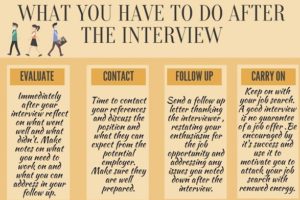
Why do you want to join our organisation? – The best guide that makes you prepare on how to respond to this Interview question.
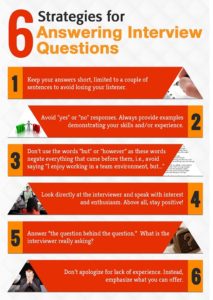
‘Why do you want to join our firm’ is one of the most frequent questions every job seeker will encounter during the interview question. Answering this common and open-ended in the best way question can make you stand out from others. Vague answers such as looking for ‘better career opportunities’ or ‘less travel’ will not take you so far.
It is incredibly challenging to answer the query; we know that. But, with a little forethought, your answer will help establish your credibility and convince the recruiter to like you. This article will outline how to prepare your answer for similar versions of questions.
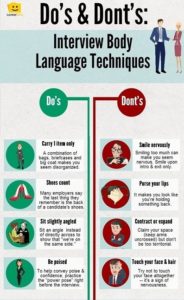
How to create a response that can convince the interviewer to hire you during the interview question
There isn’t any particular answer to this query that can convince an interviewer to pick you to fill the vacant chair. But you can employ certain strategies to prepare a response that fits your circumstances. They are –
- Focus on the cultural fit.
Think about what you have observed so far about the atmosphere of the company.
- Did you pick up on any cues during your interactions with other employees at the office?
- Is the office pin-drop silent, or have you heard the employees collaborating and communicating freely?
What have you learned about the various policies of the firm that shed light on their culture? For example,
- Do they have a charity task force?
- Do they have a flat organization that encourages everyone to contribute ideas and limits bureaucracy?
Pointing these qualities in your response adds a personal feel to the interview.
- Highlight a company’s reputation as an employer.
Learning about the company’s reputation within the industry will be a great idea. For example, if you talk to current staff about the training they have received during their employment, you could reference this during the interview. You can also talk about the interactions with the product or service of the organisation.
- What are the products or services the employer offer?
- If you are not already a consumer, sign up for a trial period or test out an item from their catalogue.
- If you enjoy the experience, consider including that feedback into your interview responses
It will be a useful point for explaining why you want to work with the company, and the recruiter will be impressed by your initiative.
- Position your candidacy within the context of the firm’s objectives.
Review the online presence of the employer, including their website, social media pages, and news coverage. Look for new product launches and signs of the organisation’s plans for future growth. If any of these initiatives seem related to your area of expertise, raise the issue during the Interview question and explain to the recruiter about how you will support those objectives.
Along with all the other responses, you also should establish an emotional connection by expressing how much you have enjoyed learning about the company.
- Be specific.
Most of the hiring managers like to see that a candidate has spent time researching the company and preparing for an interview question. It shows that you are interested in the position and have already identified concrete ways that you can contribute to the organisation.
Don’t read your responses off the page, during the interview. Instead, focus on key talking points. Keep your answers organised and intentional but unscripted. Feel free to refer notes if that will make you more comfortable. But make sure you look up to meet the interviewer’s gaze and try not to look too stiff.
- Steer the conversation toward a shared future.
Spend an equal amount of time talking and listening for the duration of the interview question, and incorporate the information you learn into your responses. As you set the scene, keep the tone positive; spend as little time as possible discussing what you don’t like about your current or previous role.
You don’t want to project negativity or resentment, because this can seem like a red flag. If an employer asks a follow-up question about what prompted you to look for another job, try to frame your answer so that it reinforces what you like about the interviewer and their company.
In a similar vein, you also want to avoid making your response too personal. There might be circumstances in your personal life that make it imperative for you to find a new job—for example, an expected layoff or income gap. No matter how pressing, don’t discuss these problems with a potential employer.
If you respect the professional boundaries of a job interview, employers will be more interested in working with you.
- Show them your personality.
Choose one of these approaches that truly reflects how you feel about an opportunity. Your response needs to be warm and unreserved. Even though you might be nervous during the job interview, don’t fall into the trap of sounding too rehearsed or emotionally removed.
Answering this question doesn’t have to be about what differentiates you from other candidates based on skill but about showing the hiring manager what matters to you. If you answer this question effectively and efficiently, it will help to make the experience positive and memorable.
In the end, your response to this question should speak to what resonates with you about the employer. So be honest and focus on the real, human connection you have with the interviewer.
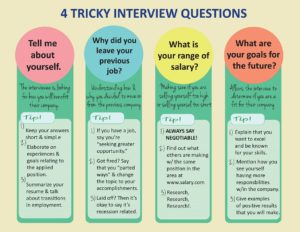

Smart skills candidates should learn for landing on their dream job.
Dream Job is no more a distant dream for job seekers with a few simple tricks.

After months of studying, you will be excited to embark on your new career path with a degree in hand. But when you first start applying to jobs, it can be overwhelming to try and figure out what employers are looking for.
You will be confident that your education will give you the technical skills you need, but the interview process still bothers you. Positions at the best firms can be competitive, even in growing industries.
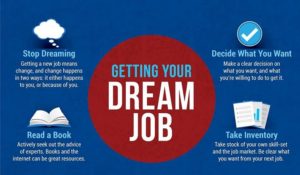
So, what can you do to make yourself stand out as a qualified job candidate to reach your dream job?
In this article, we have explained seven talents that can serve as a pillar for you to reach your dream job. Employers consider these as a foundation more decisive than any niche skillset, and employees with these skills always do better than their counterparts.
- Effective Communication.
No matter what area of work you are working in, communication will be a crucial factor in your ultimate success. It might involve proffering information to a client, telling your requirements to a supervisor, or collaborating with your peers. It might be mostly phone-based, written, or face-to-face. In today’s world, the modes of communication are practically unlimited, but the baseline skills responsible for ensuring that communication’s success is fundamental. Say what you want to say concisely, precisely, and appropriately, and try to maximise the effectiveness of your messages by picking the proper mediums for them.
- Organisation and Management.
Organisational skills help you better handle the tasks you get and ensure they are well executed. Being organised means, you’ll be more likely to get to work on time, prioritise your responsibilities effectively, and seek the best remedies to problems before they even become severe issues. Management skills are also beneficial in any position; for example, you’ll be able to manage your resources, time, and workload better. Without organisation and management skills, even the most intelligent workers often fall behind or make severe mistakes.
Negotiation is a useful tool to have in almost any position. Having it during the interview process can assure you get the best position possible. For example, if you negotiate strongly, you could acquire a higher remuneration or more competitive benefits. You can use negotiation skills for securing new clients or striking deals with potential partners. Still, it’s also useful in getting last-minute help, decreasing possible points of resistance, and lowering total costs of operation.
- Critical Thinking.
Critical thinking is a process of problem-solving that let you find and address potential weaknesses or fault points in a given context.
- It allows for more creative resolutions to problems,
- Faster evaluation of bad situations, and greater pattern identification in large systems,
- Its applications are practically infinite.
Critical thinkers are proficient of acknowledging, analysing, and solving problems without outside influence. They are always looking for improvements to add to the system.
- Teamwork and Delegation.
While some positions rely on it longer than others, you will always have some level of teamwork to handle in the workplace. When you first start off, that might mean collaborating with your supervisors and a few of your peers, but in your future, it could mean delegating work to your subordinates. Knowing how to work with others effectively and how to play to individuals’ strengths is a crucial skill for progress in your field. The better you grasp how to work in a team, the better you will be able to perform collectively. Without teamwork skills, you will end up slowing the operation down.
- Research and Analysis.
The ability to research and analysis come into play for nearly every conceivable job position. You should conduct prompt research about the company and the services they offer to the public. Being able to find information quickly, review it, and recognize key patterns is essential for practically any job function.
Confidence might seem like a feature, but it can be achieved, honed, and polished just like a skill. You can boost your confidence through sheer practice. The more often you work on something, the more confident you will be in doing it. In some areas, confidence can be a product of your practised habits. For example, if you work on enhancing your body language and elocution and thinking positive thoughts, you will normally come across as a more confident person. You will feel more confident in your regular actions. Confidence leads to greater respect, precision, and efficiency all around.
Some of these skills grow naturally over time as you earn experience in the professional world, but most of the case, you will need to seek them, acquire them, and hone them like you would other skill. Devote yourself to improving each of these individual areas and maximize your chances of getting hired and succeeding in your position.

Reach us at # + 91 77955 47089 or mail us at team@bssrecruit.com the possibility to reach your dream Job
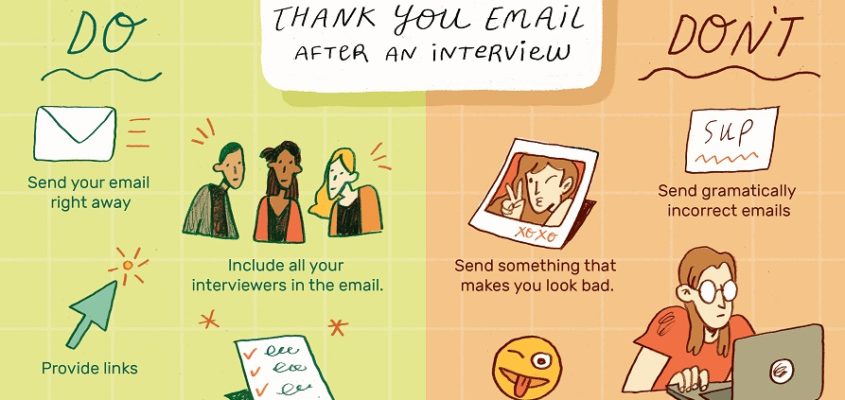
The Go-Getter’s Guide that explains the right way to follow up after an interview
Follow up after an interview
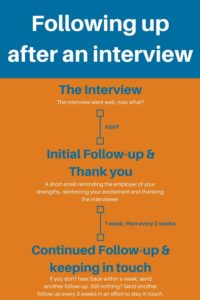
Interviews don’t just end at the moment you walk out the door. After the handshakes and the goodbyes, the major part may be over. But now the potential employers have to start making a big decision, whether you’re the person they’ve been looking for.
The appropriate interview follows up can leave a lasting, positive impression about you in the interviewer’s mind.
How you should follow up entirely depends on a few factors. It is ultimately something you need to opt for yourself. There is no one-size-fits-all solution, and following up is a good idea even if there is another interview to come. It’s worth considering even if you feel you completely nailed it.
Is following up necessary?
If you have never thought about interview follow up before you might be worrying that you have missed a trick. But, the truth is that following up is not a universal requirement, and recruiters do not always expect it. Some people never do it and simply sail into their dream job.
In reality, there are many benefits to appropriate interview follow up. You can follow-up through email, phone, or as a written note or letter.
Is it worth it?
When you get subjected to the rigorous scrutiny of an interview, it’s easy to forget that it can be tough for those doing the recruiting to choose between selections of ideal candidates. Anything you can do in your favour is worth considering.
A simple follow-up mail or quick call can make the difference between success and failure. That’s exactly why it’s so crucial to get it right. Inappropriate or misjudged interview follow up can bring unnecessary impairment to your chances.
How to Follow up after an interview in the right way after an interview
What should you say?
Though there are several approaches to interview follow up, bear in mind these three necessary things.
- It always great to say “thank you” for the interviewer’s time
- Display your enthusiasm for the job position and interest in the work
- Highlight why you are qualified and well-suited to the role
- Add or raise any critical details you forgot to acknowledge in the interview
These points portray what can be done with interviewer follow up. It may not always be essential to touch on all these things. A brief note or thank you letter can do the job.
The major aim of following up is not just to ensure you make an excellent personal impact, but to reinforce why you are the right candidate.
Remember, you were invited to the interview because you got considered to be a serious applicant. Your potential employers genuinely want to know if you are the ideal person for the position. Interview follow up helps them on working this out.
What to consider
An interview follows up sticks a lot on your assessment of what is appropriate. We have designed a list of the most critical factors to take into account:
Time: Ensure you follow up within 24 hours after the interview.
Method: Use the same kind of communication you have had with your interviewer already, creating a natural dialogue
Personality: follow-ups should be personal, so make sure to write with your voice and remind the interviewer who you really are
Formality: follow-ups should be personal, but they should also stay strictly professional, so err on the side of formality if you’re unsure
Reference: remember essential and positive points you have raised during the interview, and refer to them again
Take care: you want to be concise and give a good impression, so put time into your message and edit it until it’s perfect
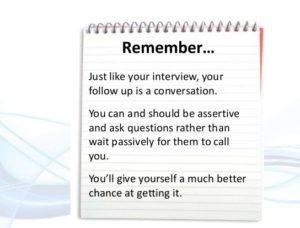
How not to follow up after an interview
While the interview follows up can be a worthwhile endeavour, it only benefits you if you get it right. There is nothing graver than running out of your track to give a wrong impression, undoing the good work of a successful interview.
There are several things to absorb in mind to assure you don’t overstep the mark:
Don’t force it: if you feel following up isn’t a good idea, then don’t. You can send a message to the recruiter if you think it will be well received
Don’t regurgitate: keep it short and don’t duplicate too much from your original application. Try to add something new or point out the key message.
Don’t oversell: you want them to feel a good impression about you, not force your greatness down their throat. So, leave the overselling nature for the interview itself
Don’t request a connection on LinkedIn: whether you get the job or not, wait until the recruitment process is over.
Do it only once! Whatever happens, don’t send them more than one message without a reply, as you may end up irritating them
Don’t go off-topic: keep it professional and focus on the job.
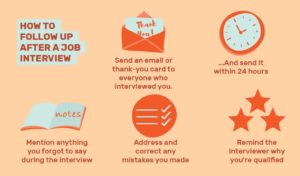
By employing these follow-up strategies, you will improve your chances of getting more offers. You will feel more empowered and efficient throughout the hiring process!
Reach us for Hiring the best candidates with the leading Recruitment consultancy at Hand Phone: +91 7795547089 or Email us at team@bssrecruit.com.
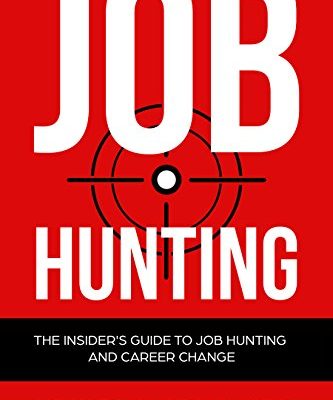
Try these tips from recruiting experts to stand out in your job hunting process
Job hunting
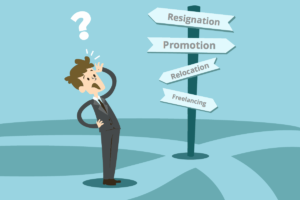
Job hunting is a process in a career. The best way to do Job hunting is explained in detail for the candidates to sail a smooth career growth.
Searching job is one of the most daunting tasks in your career. You might send applications to several positions every day, but you get no response as you imagined. It could be that your CV is getting lost in the pile of the seemingly countless other applicants you’re competing with.
Fret not. You can survive this situation by finding the best ways to distinguish yourself compellingly. In this blog, we have explained what makes a candidate stand out over the others. It will surely help you get placed quickly.
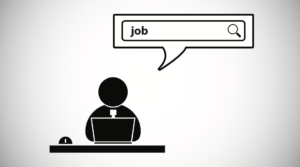
Golden tips to stand out over the others in Job hunting
- Do your homework in Job hunting.
Employers prefer to speak with a candidate who has done a bit of research on the company’s history and culture. Apart from an applicant who submits a generically compiled list of tasks, they appreciate someone who has taken the time to develop their resume specific to the opportunity they have shown interest in. It shows the recruiter that you are not just interested in a job, but a career with them. It stands out better than any other trick.
- Provide a link to your social media profiles or an online portfolio
To stand out from others, you should provide the employer with all the information they need by adding a link to your social media profile on your resume. You can also create an online portfolio with past work experience, all of your social media accounts, as well as a resume. An about.me page or a personal website is an excellent option for this. It may seem obvious, but clean up your social media presence before sharing links to it.
- Customise your resume, so it aligns with the job posting.
It’s beneficial when you take the time to utilise the verbiage that is in the job posting in your resume. It shows the hiring manager that you paid close attention to the requirements given in the job description and related those requirements to what you did at your current or previous employer. Recruiters don’t have more time to read through profiles, so when they see that the candidate’s skillsets align with the job requirements, it makes them stop and check that candidate out!
- Project the right attitude.
Every candidate will have a well-established resume. However, the charisma and positive energy that an eager candidate carries with him is a game-changer. Most of the employers opt to recruit an employee with marginally less experience but with a better drive and passion than another candidate.
- Display your personality in a positive way.
Being you by maintaining eye contact, without fidgeting is the key. Most of the companies hire you for your personality, not the long list of skills on your resume. So be enthusiastic, talk about your ideas, your achievements, and what you acquired along the way. It will show them that you are creative, innovative and unique!
- Let them know how you can solve a problem for the firm
Find an issue or opportunity that directly affects the firm you are applying to. Create a blog post outlining how to resolve the problem or how to take benefit of the opportunity. Clearly describe the steps the firm should consider. Do not post it as a blog post; instead, compose an email and send it to the person in charge of hiring. Attach a resume, but the resume should end up being a footnote to the email/blog post.
- Give the firm a taste of the work you would do if you get hired.
Take the initiative to show them what you would be like if they hire you as an employee.
For example: If you are into the marketing field, you can write up an outline of a marketing plan for their newest product launch. If it is a public relations position, you can craft a press release and outreach strategy for one of their latest products. Impress them not only with your drive but also with how serious you are about working for them.
- Show what you can do for the firm in the long term.
Employers want people who aren’t afraid of the tactical work, but who also have a strategic mind. You should be able to understand the here and now, but also focus on the future of the organization. It demonstrates your focus by being able to share what you believe they can contribute to the organisation within the next two to five years based on what you have learned about the company through the investor meetings, news, company PR releases, etc.
- Focus on accomplishments and results in more than skills.
Job applicants often put the focus on their skills and their past positions. The problem with this is that if every other candidate approaches it the same way, then there’s little scope of any applications rising to the top of the pile. An excellent way to stand out is to make your accomplishments front and centre. When focusing on achievements, be specific:
- How much money did you gain for your company?
- The money saved?
- How many people did you manage?
- What products did you launch?
- What programs did you implement?
Once you’ve listed your accomplishments, and then support them with skills and positions.
If you are still unable to find a vacant chair, you should contact a placement and recruitment consultancy who can help you accordingly. It is a great way to advance your job search.
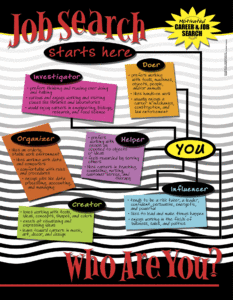
Reach us for Hiring the best candidates with the leading Recruitment consultancy at Hand Phone: +91 7795547089 or Email us at team@bssrecruit.com.
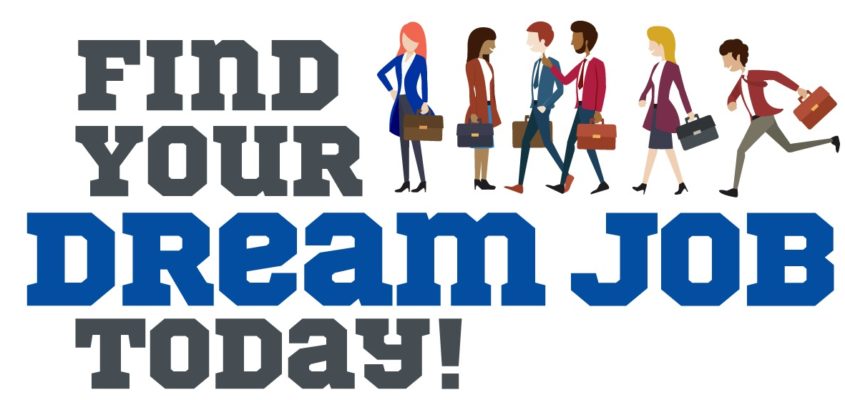
Finding your dream job with a leading and reputed placements and recruitment consultancy
Finding your dream job
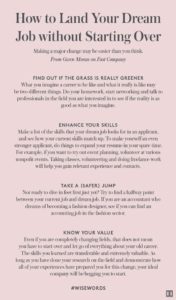
The trick of finding your dream job is an easy way to keep the passion alive with career growth growing.
Finding a dream job is not a hard task ahead.
Are you planning to turn yourself into a new career direction? Then, you might be very much excited about it. Whether you are in search of an opportunity in the current field or want to enter an entirely new career world, the excitement of a new career is often thwarted by the daunting task of job searching.
- Some candidates go through each and every job boards to find potential openings.
- Some put more time into perfecting the resume or sit around, waiting for the phone to ring?
But how will you figure out you are in front of the right employer?
To make your encounter with a hiring manager a piece of cake you should consider working with a recruiter. When working with a recruitment agency, you’re not alone in your job hunt. An experienced recruiter could match you with a job that requires your skills and expertise. Hence, you will not knock the wrong door.

Who is a recruiter?
Recruiters are a group of individuals who get hired by businesses looking for employees to fill their vacant chairs. They don’t find jobs for people. They find people for jobs.
However, you win several perks as a job candidate in a recruiter’s candidate pool. Given below are seven major reasons why you should use a recruiter for your job quest.
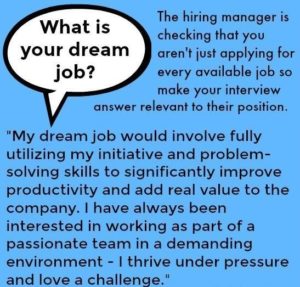
Seven major reasons why you should use a recruiter for finding your dream job
- Recruiters save you time.
How many hours do you spend searching for companies and sending applications? By using a recruiter, you split the load of work. Recruiters spend eight hours a day trying to find applicants for their clients. They know exactly what jobs are out there and they devote a large amount of time to fill them.
You have other responsibilities in life that keep you from job seeking. Mostly you might be working for your current boss until a new opportunity turns up. Or you could also be in school or college or taking care of your family. Using a recruiter saves a lot of time on your job hunt.
- You can network on a larger scale.
You may think about your current job-search connections, past employers, friends, and family. Even if that group is vast, it does not meet the amount that recruiters can reach. So, take advantage of a recruiter’s connections to get the best job according to your skillset.
When you send CV to an HR department, you rely on that document to get considered for the job. But if a recruiter feels you are a good match for their client, you have someone in your corner.
Recruiters pay a lot of time building relationships through databases, phone calls, and face-to-face networking. While working with a recruiter, your network grows exponentially.
- Recruiters help you through the process.
A good recruiter aims to provide the best candidates for their clients. Most of the recruiters will prepare you for the job placement process, from applying to accepting an offer. If you opt the right recruiter, most of your questions will get answered.
You can also update your resume, portfolio, and other documents with the assistance of a recruiter. They can guide you on interviewing techniques, and, after your interview with the employer, the recruiter can give you feedback.
- Recruiters want to place the best candidates.
Recruiters receive his service charges when you accept a job offer. So, they approach more candidates as a part of the game. Therefore, recruiters are competitive about picking out the best candidates who will satisfy their clients. That drive can only benefit you in your job search.
- You have access to more opportunities.
Do you know that not all open positions get posted on job boards? Some firms only post available jobs on their websites. But others strictly rely on third-party sourcing agencies to find potential candidates. You could be missing out a lot of opportunities if solely rely on job-search websites.
Recruiters can point you towards job openings that are hard to find. They can give you access to those confidentially advertised jobs or not yet posted on the internet. You will get more options to apply to, and have a better chance of receiving the job offer you want.
- You have specialized skills.
Certain job positions require a unique set of skills. Sometimes, there are fewer qualified applicants than the number of open positions.
For example, some locations have a hard time filling software developers. If you fall into an industry that necessitates specialized skills, you should certainly use a recruiter.
Recruiters know their clients very well, which means they can identify what kind of candidate fits the best to the client’s need. They can also give you even minute details about the company and the job position that you might not be able to comprehend from a normal. With a highly experienced recruiter, you are more likely to cross paths with an employer in need of your unique skills.
- You stay in a database.
Even if you didn’t get hired for the first potential match, you would stay in the recruiter’s database. Your resume will not get tossed if an offer doesn’t pan out immediately. Instead, you will get added on the candidate pool of the recruiter for future positions.
You might think your resume will get lost in a huge pool of candidates. But, that’s not the case. Recruiters employ applicant tracking systems that make sorting candidates easily. The software pulls out specific information from your CV and matches it to suitable jobs. Hence, your resume will surface when the right job opening comes along.
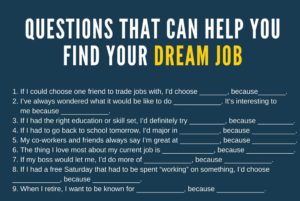
Reach us for finding your dream job with the leading Recruitment consultancy at Hand Phone: +91 7795547089 or Email us at team@bssrecruit.com.




